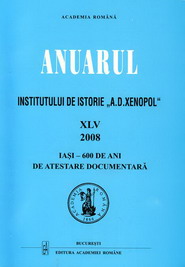Repere ale memoriei paşoptiste: 11 iunie in calendarele româneşti
Making the Memory of the 1848 Revolution: The 11st June in the Romanian Calendars
Author(s): Mihai ChiperSubject(s): Cultural history
Published by: Editura Academiei Române
Keywords: traditions; identity of the group; annual calendars; organization of the memory; national celebration
Summary/Abstract: No matter the society a calendar can represent true “time maps” as well as some of the most important, active and normative „lieux de memoire”. It is here that we can find the orientation of traditions, especially the values which the individual define as essential for the identity of the group. And because of that, the annual calendars often managed to showcase the long conventional story told by communities at that time. Therefore, for the modern Romanian society the role played by the calendar in the social organization of the memory as well as the creation of the collective views about the past needs to be considerably reevaluated. As part of a whole collection of studies about the memory of revolution in 1848 in the Romanian society, this text intends to represent the role played by calendars in placing the day 11 June 1848 among other important national celebrations in the second part of the 19th century. In most calendars, we could find the day of 11th of June as the national celebrations that Carol Hohenzollern considered: 10 May, 8/24 April. Except these days, the day of the revolution used 94 MIHAI CHIPER to represent one of the most mentioned political celebration in the calendar together with 24 January, despite the lack of support from official regulations after 1866. 11 June remains a popular day and consistently placed among other memorable days for the nation in spite of “Rules with regard to the days that Christian Orthodox should respect in the course of time” in 1874, presented by Carol Hohenzollern, that didn’t recognize 11 June as a national celebration. This day will continue to be represented in the national calendars as a day of enlightenment, and thus to have won a well deserved place among a grand cycle of historical moments for the nation. Often improperly characterized as the day in which people won their “total autonomy”, description that doesn’t reflect at all the historical reality, but merely a programmatic desiderate attributed postfactum, 11 June embedded complex aspirations and a clear message for the generations to come: regeneration, national awakening and independence.
Journal: Anuarul Institutului de Istorie »A.D. Xenopol« - Iaşi
- Issue Year: XLV/2008
- Issue No: 45
- Page Range: 77-94
- Page Count: 17
- Language: Romanian

